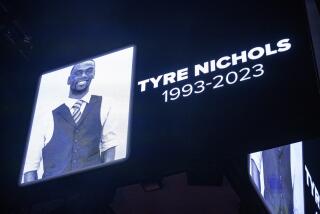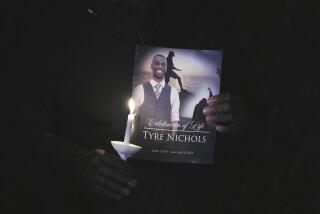Defense Splits in Oklahoma Bomb Case : Court: Lawyers are at odds over judge, venue. Defendants Nichols and McVeigh may have separate trials and may testify against each other.
- Share via
OKLAHOMA CITY — In a major break over legal strategy, the two defense teams in the bombing of the Oklahoma City federal building split Wednesday over some of the most important issues in the case and no longer agree about who should hear the trial or whether it should take place anywhere in Oklahoma.
The abrupt breakdown in what had been shaping up as a dual-track defense is now seen by some legal observers as establishing the groundwork for separate trials for defendants Timothy J. McVeigh and Terry L. Nichols. That scenario also raises the possibility that the two former Army buddies eventually will testify against each other.
Michael E. Tigar, an Austin, Tex., attorney representing Nichols, filed an appeal Wednesday with the U.S. 10th Circuit Court of Appeals in Denver, pressing his demand that U.S. District Judge Wayne E. Alley of Oklahoma City step down.
He argued that Alley is a “victim” of the April 19 bombing, which claimed the lives of 169 people and injured hundreds more, because his courtroom and chambers were damaged when the blast destroyed the Alfred P. Murrah Federal Building next door.
The lawyer suggested that Alley’s decision earlier this month not to step down had a “somewhat contemptuous tone” and that the judge’s “conclusion is unwarranted.”
“Can a judge who, along with his co-workers, has himself been directly victimized by a crime of violence sit in judgment over one accused of committing that very crime?” Tigar asked the appellate court.
Last month, Stephen Jones of Enid, Okla., the lawyer for McVeigh, sided with Tigar in legal briefs urging Alley to recuse himself. But he now says he has changed his mind and is willing to accept Alley. Using an old football analogy, he said that he fears a replacement judge could be more detrimental to the defense.
“There are four things that can happen when you throw the ball in the air,” he said. “And three of them are bad.”
On a second front, Tigar said that he plans to file a separate appeal for a change of venue, challenging Alley’s decision to conduct the trial in Lawton, in the southwest part of the state.
Jones earlier embraced the change of venue with Tigar. But now he is saying that he may very well accept Lawton, pointing to a new statewide poll that--surprisingly--shows 45% of residents in the state’s southwest region are undecided about McVeigh’s guilt or innocence.
Those numbers are particularly impressive to Jones. From the beginning, his client has been depicted as the prime mover in the bombing.
“I’m warming to Lawton,” Jones said.
Both defense attorneys also said they want separate trials.
Tigar has repeatedly pointed out that Nichols was not even in Oklahoma on the day of the blast. But Jones has indicated that McVeigh never had the means or the brains to single-handedly carry out the worst terrorist attack in U.S. history.
With such deep disagreements this soon in the pretrial phase of the case (the trial is scheduled to begin in May), some legal scholars believe that any hope of a unified defense is now dashed.
This kind of fracturing also could complicate problems for the defense attorneys.
“You try to have a united defense,” said Cristina Arguedas, a Bay Area attorney and former federal public defender. “Your major opponent is the government. You make every effort to make sure the defense teams work and coordinate efforts, but sometimes you can’t.”
And when defense teams divide and go their own way, she said, “instead of having one adversary, you have two.”
She added that if separate trials are granted, the testimony of McVeigh and Nichols against each other could be devastating.
Nichols told authorities after his arrest that McVeigh had told him “something big is going to happen.” But McVeigh, according to the government, was helped by Nichols in obtaining, storing and mixing many of the bomb’s ingredients.
Both defense factions are pursuing strategies that they see as best for their clients. “I’m not a party to all of the considerations that Mr. Jones has,” Tigar said. “He has to represent his client according to his client’s best lights.”
He said that he could not predict whether the court will allow two trials, something the government opposes because both defendants are charged in a single conspiracy indictment.
More to Read
Sign up for Essential California
The most important California stories and recommendations in your inbox every morning.
You may occasionally receive promotional content from the Los Angeles Times.









